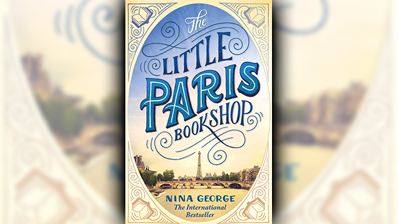Stephanie Jones: Book Review - The Little Paris Bookshop by Nina George
- Publish date
- Friday, 24 Apr 2015, 1:43PM

Nina George’s enchanting novel The Little Paris Bookshop tells the story of Jean Perdu, a purveyor of books who trafficks his wares from a floating barge he calls the Literary Apothecary (which, as a title, would have better reflected the rapturous, celebratory tone of the tale, but never mind).
Now 50 years old, Monsieur Perdu has been existing largely inside his own memories for the past two decades, having “become extremely good at ignoring anything that might in any way arouse feelings of yearning. Aromas. Melodies. The beauty of things.” In his view, any moored ship, such as the one in his possession, which harbours 8,000 books, is an arrested adventure – so, it is clear, is his own life.
The reason for his careful avoidance of arousal is a lost love. When Manon departed abruptly, leaving nothing in her wake but a letter which Perdu has steadfastly refused to read, he walled up the room in his apartment at 27 Rue Montagnard that she called the Lavender Room and embarked on a life of pure asceticism.
His living room contains nothing but a jigsaw puzzle strewn on the floor, he listens to but does not participate in the lives of those with whom he shares the large house, and he dedicates himself to prescribing the ideal text to every soul who comes aboard his barge – so named because Perdu wanted to treat feelings that are not recognized as afflictions. A common misconception, in his view, is that booksellers look after books, while in truth, they look after people. Make no mistake, The Little Paris Bookshop is the work of a writer who has spent her life loving books and those who usher them into being.
Perdu is a man made stupid by love and fear, paralyzed by his inability to forgive himself or accept that the icon of his life is merely mortal. Even as he uses books as balms for others – in a manner that will be familiar to readers of Joanne Harris’ similarly lyrical Chocolat – he is unable to teach or console himself.
Enter Catherine, the woman with the task of yanking Perdu back into the land of the living. At this point, he makes a number of audacious embarkations: a relationship with Catherine, a journey through the canals of France, and a revisiting of his time with Manon, whose voice emerges in excerpts from her travel diary. Tiny, idiosyncratic French towns and their wise and eccentric inhabitants, each with something to teach the apothecary: George doesn’t do anything exactly new, but she portrays Perdu’s rebirth with such fervour and glee that it feels fresh.
George’s writing is striking yet harmonious, lyrical and marked by compassion. As we meet him, Perdu is a background character struggling to break free from grief in mid-life, “a small figure in a painting, while life was played out in the foreground.” His slow and persistent revival, coming to terms and renewed self-discovery is contained within a novel that extols books and that ends with an emphatic and moving refutation of death’s finality.
Perdu regards books as both “freedoms” and homes, the vessels that preserve good words seldom used. With The Little Paris Bookshop, his creator offers up a glorious work that proves the truth of this perspective.
Take your Radio, Podcasts and Music with you

